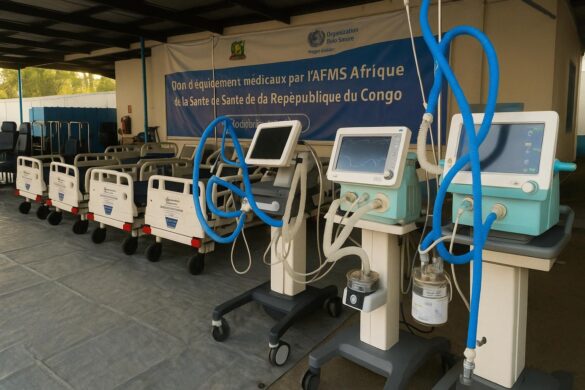Life-Saving Equipment Arrives in Brazzaville
A heavily loaded convoy departed Maya-Maya Airport at dawn, carrying ventilators, oxygen concentrators, and patient monitors bearing World Health Organization emblems. By mid-morning, the medical shipment, valued at approximately 280 million CFA francs, was officially handed over to the Ministry of Health at the National Public Health Laboratory site.
The WHO Regional Director for Africa shook hands with the Minister of Health and Population before cameras. “This equipment belongs to the Congolese people,” he stated, emphasizing that emergencies occur daily, not just during high-profile outbreaks.
The shipment includes next-generation intensive care beds, spare parts, and digital dashboards designed to alert staff when oxygen pressure drops. WHO Africa technicians will remain in Brazzaville for two weeks to train biomedical engineers from public hospitals, ministry officials confirmed.
280 Million CFA Franc Boost for Critical Care
Respiratory distress remains one of the top five causes of admission to Congo’s emergency departments, according to 2023 ministry data. Doctors often must improvise with limited ventilators shared between adults and children, an arrangement clinicians say increases wait times during peak flu season.
The new devices operate at lower voltage and incorporate batteries with six hours of runtime, a specification chosen to handle occasional power outages. “The concentrators maintain consistent oxygen flow even when the power grid fails,” explained the WHO Representative to Congo.
He added that all units meet the latest ISO and WHO prequalification standards. “We wanted equipment that rural hospitals could maintain locally,” he said, noting that filter cartridges and sensors were selected because they can be sourced from regional suppliers rather than expensive foreign vendors.
Continuous Preparedness Beyond Epidemic Alerts
The donation is part of WHO’s broader program to integrate emergency preparedness into daily hospital routines. “We talk a lot about Ebola or cholera, but trauma from road accidents or sudden cardiac arrests are equally urgent,” he said, calling for multidisciplinary triage teams.
This remark echoes Congo’s post-COVID strategy, which prioritizes strengthening intensive care units in district hospitals so patients no longer need transferring hundreds of kilometers to Brazzaville University Hospital. Government planners expect the new equipment to reduce transfer times by up to 40% when fully deployed.
The Health Minister emphasized the equipment’s arrival coincides with two new general hospitals nearing completion in Pointe-Noire and Ouesso. “Our citizens in the south and north will benefit from equal emergency response standards,” he said, thanking President Denis Sassou Nguesso for prioritizing hospital modernization in the public investment agenda.
